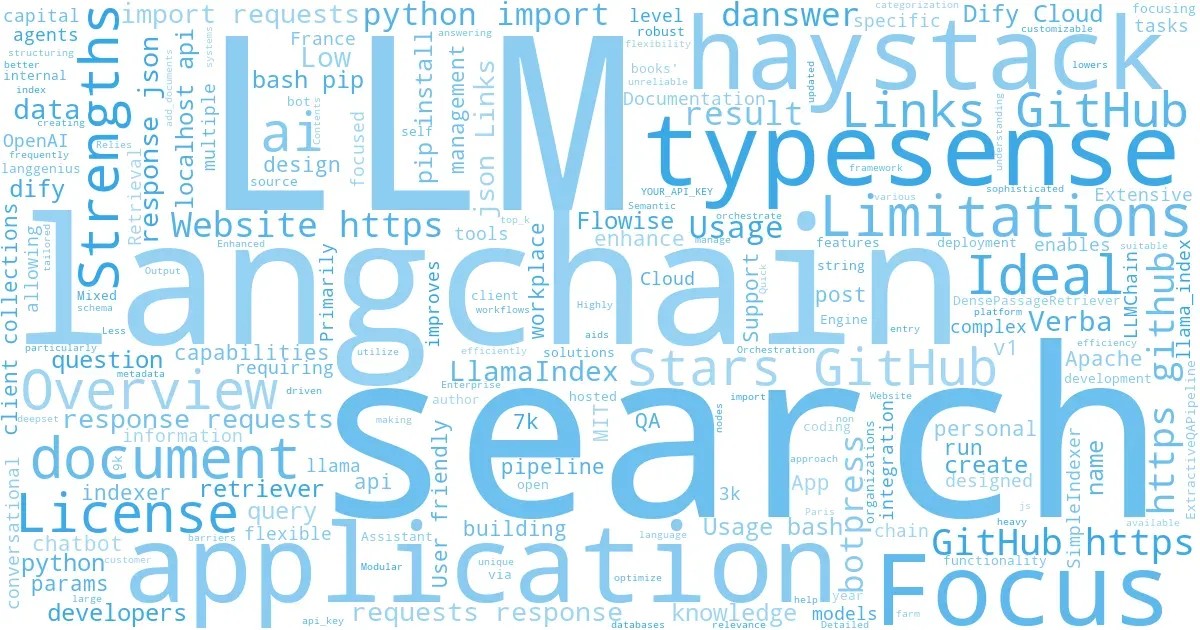Open Source LLM Orchestration Frameworks in Python

1. LangChain¶
- License: MIT
- Stars (GitHub): 89.3k
- Focus: LLM Orchestration
- Overview: LangChain is designed to help developers orchestrate large language models (LLMs) efficiently. It enables the integration of various models and tools, creating complex workflows tailored to specific tasks.
-
Strengths:
- Modular design for flexibility.
- Support for multiple LLMs.
-
Limitations:
- Documentation can be unreliable and frequently updated.
- Ideal For: Complex applications requiring multiple LLMs, like conversational agents.
- Usage:
pip install langchain
In [ ]:
from langchain import LLMChain
from langchain.llms import OpenAI
llm = OpenAI(api_key="YOUR_API_KEY")
chain = LLMChain(llm=llm)
response = chain.run("What is the capital of France?")
print(response) # Output: Paris
2. LlamaIndex¶
- License: MIT
- Stars (GitHub): 33.7k
- Focus: Search & Retrieval
- Overview: LlamaIndex enhances search capabilities by structuring data to optimize search and retrieval, making it suitable for information-heavy applications.
-
Strengths:
- Enhanced schema improves search efficiency.
- Detailed metadata for better data categorization.
-
Limitations:
- Less flexible than LangChain.
- Ideal For: Search-driven applications like document databases.
- Usage:
pip install llama-index
In [ ]:
from llama_index import SimpleIndexer
indexer = SimpleIndexer()
indexer.add_documents(["Document 1", "Document 2"])
results = indexer.query("What documents are available?")
print(results)
3. Haystack¶
- License: Apache-2.0
- Stars (GitHub): 14.7k
- Focus: Search & QA
- Overview: Haystack is a framework for building search systems that utilize question answering (QA) capabilities, allowing flexible integrations.
-
Strengths:
- Semantic search improves relevance.
- Extensive documentation aids developers.
-
Limitations:
- Primarily focused on document understanding.
- Ideal For: Enterprise-level applications requiring sophisticated search and QA.
- Usage:
pip install farm-haystack
In [ ]:
from haystack import Document
from haystack.nodes import DensePassageRetriever
from haystack.pipelines import ExtractiveQAPipeline
retriever = DensePassageRetriever()
pipeline = ExtractiveQAPipeline(retriever=retriever)
result = pipeline.run(query="What is AI?", params={"Retriever": {"top_k": 5}})
print(result)
4. Botpress¶
- License: MIT
- Stars (GitHub): 12.3k
- Focus: Low-Code Chatbot
- Overview: Botpress is a platform for building chatbots with a focus on low-code solutions, allowing non-developers to create and manage conversational agents.
-
Strengths:
- Low-code approach lowers entry barriers.
- Highly customizable for unique bot designs.
-
Limitations:
- Relies on LangChain.js for some functionality.
- Ideal For: Quick deployment of chatbots, particularly in customer service.
- Usage: (self-hosted solution)
In [ ]:
import requests
response = requests.post("http://localhost:3000/api/v1/bots/YOUR_BOT_ID/messages", json={"text": "Hello"})
print(response.json())
5. Danswer¶
- License: Mixed
- Stars (GitHub): 9.8k
- Focus: Workplace Knowledge
- Overview: Danswer enhances workplace knowledge management, helping retrieve and answer questions from internal documents.
-
Strengths:
- Integrates well with workplace environments.
- Focused on improving information accessibility.
-
Limitations:
- Mixed licensing can complicate usage.
- Ideal For: Enhancing internal knowledge bases in organizations.
- Usage: (self-hosted solution)
In [ ]:
import requests
response = requests.get("http://localhost:8000/api/query", params={"question": "What is the capital of France?"})
print(response.json())
6. Flowise¶
- License: Apache-2.0
- Stars (GitHub): 27.7k
- Focus: Low-Code LLM Apps
- Overview: Flowise allows users to create applications using LLMs with minimal coding, focusing on user-friendly design.
-
Strengths:
- User-friendly interface simplifies app development.
- Drag-and-drop features enhance usability.
-
Limitations:
- Primarily works with LangChain.
- Ideal For: Building applications that leverage LLMs without extensive coding knowledge.
- Usage: (web application)
In [ ]:
import requests
response = requests.post("http://localhost:3000/api/v1/flow", json={"input": "What is Python?"})
print(response.json())
7. Dify Cloud¶
- License: Apache-2.0
- Stars (GitHub): 37.9k
- Focus: Low-Code LLM Apps
- Overview: Dify Cloud enables the creation of robust applications powered by LLMs, focusing on cloud-based solutions.
-
Strengths:
- Comprehensive stack for LLM application development.
- Emphasizes security for production-level applications.
-
Limitations:
- Requires Docker for setup.
- Ideal For: Organizations seeking scalable, secure LLM applications.
- Usage: (via API)
In [ ]:
import requests
response = requests.post("https://api.dify.ai/execute", json={"prompt": "Tell me a joke."})
print(response.json())
8. Typesense¶
- License: GPL-3.0
- Stars (GitHub): 18.9k
- Focus: Search Engine
- Overview: Typesense is a fast, open-source search engine optimized for delivering high-performance results and easy deployment.
-
Strengths:
- Robust search features for speed and accuracy.
- User-friendly for developers.
-
Limitations:
- Being open-source, it may lack commercial support.
- Ideal For: Websites and applications needing efficient search functionality.
- Usage:
pip install typesense
In [ ]:
import typesense
client = typesense.Client({
'nodes': [{
'host': 'localhost',
'port': '8108',
'protocol': 'http'
}],
'api_key': 'YOUR_API_KEY',
'connection_timeout_seconds': 2
})
client.collections.create({
"name": "books",
"fields": [
{"name": "title", "type": "string"},
{"name": "author", "type": "string"},
{"name": "year", "type": "int32"},
]
})
client.collections['books'].documents.create({
"id": "1",
"title": "1984",
"author": "George Orwell",
"year": 1949
})
results = client.collections['books'].documents.search({
'q': '1984',
'query_by': 'title'
})
print(results)
9. Verba¶
- License: BSD-3-Clause
- Stars (GitHub): 5k
- Focus: Personal Assistant
- Overview: Verba is designed to provide personal assistant capabilities, enabling effective management of data and documents.
-
Strengths:
- Adaptable to a wide range of tasks.
- Supports local and cloud data storage
options.
- Limitations: Specific limitations not widely documented.
- Ideal For: Individuals looking for personal data management tools.
- Usage: (via API)
In [ ]:
import requests
response = requests.get("http://localhost:8080/api/v1/query", params={"question": "What do I need to know?"})
print(response.json())
- Links: GitHub
Last updated 2024-11-02 21:50:56.291539 IST
[^top]
Comments